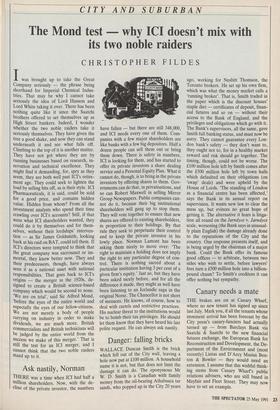Danger: falling bricks
WALLACE Duncan Smith is the brick which fell out of the City wall, leaving a hole now put at £100 million. A household name it is not, but that does not limit the damage it can do. The eponymous Mr W. D. Smith is a Canadian with family money from the oil-bearing Athabasca tar sands, who popped up in the City 20 years ago, working for Nesbitt Thomson, the Toronto brokers. He set up his own firm, which was what the money market calls a `running broker'. That is, Smith traded in the paper which is the discount houses' staple diet — certificates of deposit, finan- cial futures and so on — without their access to the Bank of England, and the privileges and obligations which go with it. The Bank's supervisors, all the same, gave Smith full banking status, and must now be sorry. They cannot guarantee every Lon- don bank's safety — they don't want to, they ought not to, for in a healthy market reward and risk should go together. The timing, though, could not be worse. The £100 million hole left by Smith comes after the £500 million hole left by town halls which defaulted on their obligations (on `swap' deals) and were upheld by the House of Lords. 'The standing of London as a financial centre has been affected,' says the Bank in its annual report on supervision. It wants new law to clear the mess up, but evinces no great hope of getting it. The alternative it fears is litiga- tion all round on the Jarndyce v. Jarndyce scale, worsening (the Bank saysin unusual- ly plain English) the damage already done to the reputations of the City and the country. One response pres'ents itself, and is being urged by the chairman of a major bank. Could the Bank offer its famous good offices — to arbitrate, between two sides who wish to settle, before lawyers' fees turn a £500 million hole into a billion- pound chasm? To Smith's creditors it can offer nothing but sympathy.


















































 Previous page
Previous page